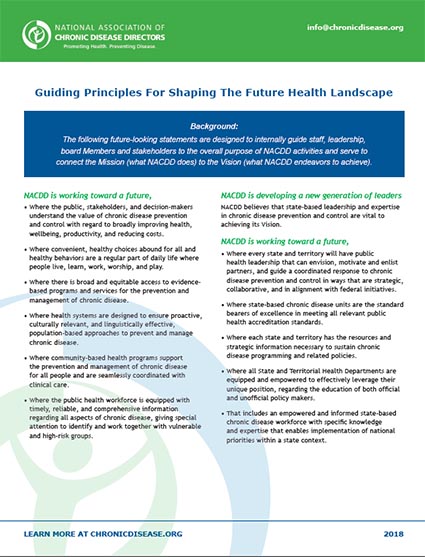Guiding Principles for Shaping the Future Health Landscape

Background: The following future-looking statements are designed to internally guide staff, leadership, board members and stakeholders to the overall purpose of NACDD activities and serve to connect the mission (what NACDD does) to the vision (what NACDD endeavors to achieve).
Where the public, stakeholders and decision-makers understand the value of chronic disease prevention and control with regard to broadly improving health, well-being, productivity and reducing costs.
Where convenient, healthy choices abound for all and healthy behaviors are a regular part of daily life where people live, learn, work, worship and play.
Where there is broad and equitable access to evidence-based programs and services for the prevention and management of chronic disease.
Where health systems are designed to ensure pro-active, culturally relevant and linguistically effective, population based approaches to prevent and manage chronic disease.
Where community-based health programs support the prevention and management of chronic disease for all people and are seamlessly coordinated with clinical care.
Where the public health workforce is equipped with timely, reliable and comprehensive information regarding all aspects of chronic disease, giving special attention to identify and work together with vulnerable and high risk groups.
NACDD is Developing a New Generation of Leaders
NACDD believes that state-based leadership and expertise in chronic disease prevention and control are vital to achieve its action.
NACDD is working toward a future,
Where every state and territory will have public health leadership that can envision, motivate, and enlist partners, and guide a coordinated response to chronic disease prevention and control in ways that are strategic, collaborative and in alignment with federal initiatives.
Where state-based chronic disease units are the standard bearers of excellence in meeting all relevant public health accreditation standards.
Where each state and territory has the resources and strategic information necessary to sustain chronic disease programming and related policies.
Where all states and territorial health departments are equipped and empowered to effectively leverage their unique position, regarding the education of both official and unofficial policy makers.
What includes an empowered and informed state-based chronic disease workforce with specific knowledge and expertise that enables implementation of national priorities within a state context.
